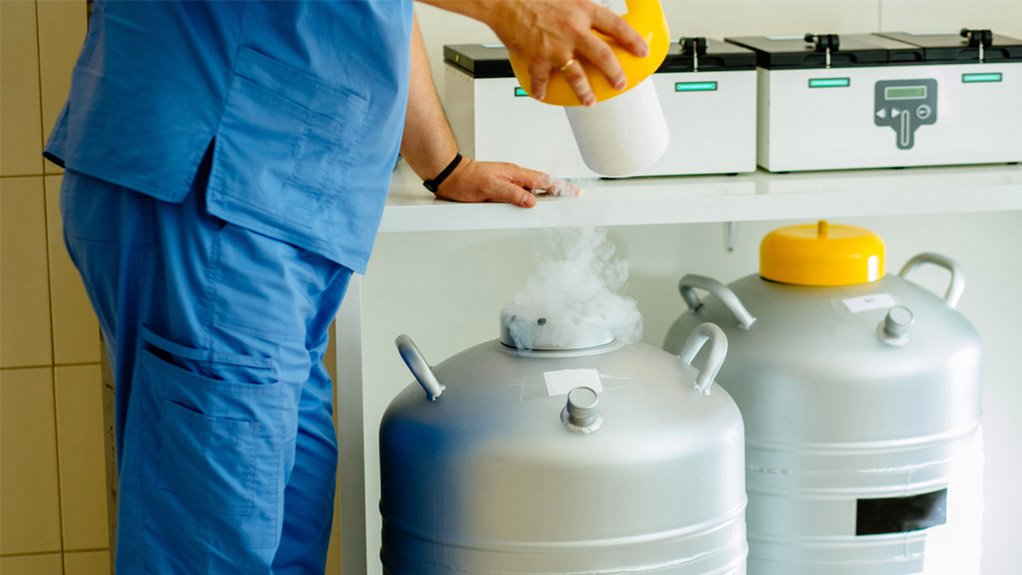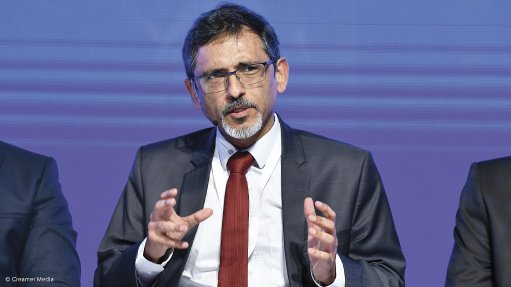Afrox advances fertility treatment in South Africa
This article has been supplied as a media statement and is not written by Creamer Media. It may be available only for a limited time on this website.
Global fertility rates are reported to have decreased by about half since 1960, largely because women are choosing to have children at a later stage in their lives. This causes more and more women to experience difficulty in getting pregnant.
For several years now, Afrox has been assisting fertility treatment specialists in their efforts to help women conceive. At the forefront of this process is IVF (in vitro fertilisation), which involves removing a woman’s ‘eggs’ and using sperm to fertilise them under ideal conditions – originally in test tubes (in vitro).
The IVF process starts with the collection of ova or egg cells, called oocytes, from the woman and a sperm sample from the man.
The oocytes are placed in IVF culture medium until they are ready for insemination. Then, a specific volume of sperm is added to the oocytes in a culture dish and, hopefully, fertilises the oocytes.
“The inseminated oocytes are then placed in a bench-top incubator. Fertilisation evaluation takes place 16-18 hours post insemination and, if fertilisation is successful, the oocytes become embryos, with cell division occurring during day 2, 3, 4, 5 and 6 of the process.
The day 5 embryo – called a blastocyst – can then be transferred into the woman’s uterus. If the procedure is successful, a normal pregnancy follows, leading to the birth of a healthy child.
HiQ gas and IVF culture media
The culture medium inside IVF bench-top incubators plays a vital role in mimicking the natural (in vivo) environment of the woman’s womb. The embryos must be supplied with the correct amount of nutrients and minerals required for each specific stage of their development, while the incubators ensure ideal temperature, humidity, pH and other physiological conditions to give the best possible chance of success.
HiQ represents precision specialty gases and a number of unique products exist in the HiQ range that are exclusively available from Afrox to customers and institutions in sub-Sahara Africa.
HiQ gas mixtures for IVF consist of oxygen (O2), which is used to generate ATP, the primary energy carrier in many intracellular biochemical reactions; nitrogen (N2), which reduces and regulates the oxygen concentration; and carbon dioxide (CO2), which is used to regulate the acidity (pH) of the culture medium.
“To optimise the conditions for embryo culture, the pH level is critical,” Strydom explains. “Sodium bicarbonate is continuously dissociating in the culture solution, increasing the alkalinity. The addition of CO2 from the HiQ gas compensates for this by raising the acidity, thus regulating the pH of the culture medium.
“We have discovered, however, that different HiQ gas compositions are necessary depending on the altitude above sea level and other environmental factors. Lower atmospheric pressure means lower partial CO2 pressure, which results in less CO2 in the incubators, which impacts embryo culture and development,” he explains, adding to his point that “what works in Cape Town will not work in Johannesburg”.
Also, though, the gas mixture used has to be highly accurate and free of contaminants. “Afrox creates these mixtures gravimetrically; by calculating the exact molar compositions needed of each constituent and then creating the precise mix required from individual gases with purity levels of 99.999%,” he says.
Afrox’s HiQ gases are mixed then tested at its state-of-the-art Germiston laboratory, which delivers a certificate guaranteeing the composition of each batch of HiQ gas manufactured. “We also use special ultra-clean HiQ cylinders and, from a delivery perspective, as the infertility clinics cannot wait 10 days for a refill IVF mix, we guarantee that we can deliver at very short notice to any of the IVF laboratories we serve,” he says.
“Through continuous improvement of our HiQ IVF gas quality and composition, more optimal in vitro culture conditions have been made possible, which has contributed to ongoing improvements in the success rates of fertility treatment.
“This has led to the establishment of several new clinics and the rise in the number of women who have successfully conceived via IVF in South Africa, which makes all of us at Afrox particularly proud,” Strydom concludes.
Comments
Press Office
Announcements
What's On
Subscribe to improve your user experience...
Option 1 (equivalent of R125 a month):
Receive a weekly copy of Creamer Media's Engineering News & Mining Weekly magazine
(print copy for those in South Africa and e-magazine for those outside of South Africa)
Receive daily email newsletters
Access to full search results
Access archive of magazine back copies
Access to Projects in Progress
Access to ONE Research Report of your choice in PDF format
Option 2 (equivalent of R375 a month):
All benefits from Option 1
PLUS
Access to Creamer Media's Research Channel Africa for ALL Research Reports, in PDF format, on various industrial and mining sectors
including Electricity; Water; Energy Transition; Hydrogen; Roads, Rail and Ports; Coal; Gold; Platinum; Battery Metals; etc.
Already a subscriber?
Forgotten your password?
Receive weekly copy of Creamer Media's Engineering News & Mining Weekly magazine (print copy for those in South Africa and e-magazine for those outside of South Africa)
➕
Recieve daily email newsletters
➕
Access to full search results
➕
Access archive of magazine back copies
➕
Access to Projects in Progress
➕
Access to ONE Research Report of your choice in PDF format
RESEARCH CHANNEL AFRICA
R4500 (equivalent of R375 a month)
SUBSCRIBEAll benefits from Option 1
➕
Access to Creamer Media's Research Channel Africa for ALL Research Reports on various industrial and mining sectors, in PDF format, including on:
Electricity
➕
Water
➕
Energy Transition
➕
Hydrogen
➕
Roads, Rail and Ports
➕
Coal
➕
Gold
➕
Platinum
➕
Battery Metals
➕
etc.
Receive all benefits from Option 1 or Option 2 delivered to numerous people at your company
➕
Multiple User names and Passwords for simultaneous log-ins
➕
Intranet integration access to all in your organisation























